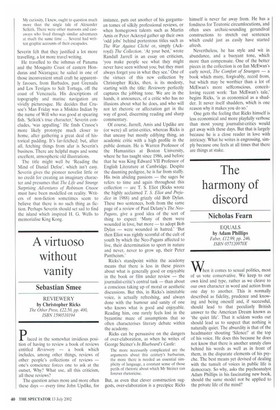A virtuoso without vanity
Sebastian Smee
REVIEWERY by Christopher Ricks The Other Press, £22.50, pp. 400, ISBN 1590510194 Placed in the somewhat invidious position of having to review a book of reviews entitled Revieway — a book which includes, among other things, reviews of other people's collections of reviews — one's conscience forces one to ask at the outset, Why? What use, all this criticism, all these reviews?
The question arises more and more often these days — every time John Updike, for instance, puts out another of his gargantuan tomes of silkily professional reviews, or when homegrown talents such as Martin Amis or Peter Ackroyd gather up their own 'odd jobs' behind portentous titles such as The War Against Cliche or, simply (Ackroyd) The Collection. 'At your best,' wrote Randall Jarrell in an essay on criticism, 'you make people see what they might never have seen without you; but they must always forget you in what they see.' One of the virtues of this new collection by Christopher Ricks, then, is its modesty, starting with the title: Reviewety perfectly captures the jobbing tone. We are in the hands, it announces, of a critic who has no illusions about what he does, and who will not let rhetoric or affectation get in the way of good, discerning reading and sharp commentary.
Of course, Jarrell, Amis and Updike are (or were) all artist-critics, whereas Ricks is that uneasy but mostly edifying thing, an academic critic with a high profile in the public domain. He is Warren Professor of the Humanities at Boston University, where he has taught since 1986, and before that he was King Edward VII Professor of English Literature at Cambridge. Despite the daunting pedigree, he is far from stuffy. His twin abiding passions — the sages he refers to time and again throughout this collection — are T. S. Eliot (Ricks wrote the highly acclaimed T S. Eliot and Prejudice in 1988) and grizzly old Bob Dylan. These two sentences, both from the same page of a review of Paul Delany's The NeoPagans, give a good idea of the sort of thing to expect: 'Many of them were wounded in love, but more — to adopt Bob Dylan — were wounded in hatred.' But then Eliot was rightly scornful of the cult of youth by which the Neo-Pagans affected to live, their determination to sport in nature and never, never to grow up, their Peter Pantheism.'
Ricks's standpoint within the academy means that there is less in these pieces about what is generally good or enjoyable in the book or film under review — the journalist-critic's central task — than about a conscious taking up of moral or aesthetic discussions. But this, in Ricks's inimitable voice, is actually refreshing, and always done with the humour and sanity of one who knows what is good and enjoyable. Reading him, one rarely feels lost in the byzantine maze of assumptions that so often characterises literary debate within the academy.
Ricks can be persuasive on the dangers of over-elaboration, as when he writes of George Steiner's In Bluebeard's Castle:
The more necessarily complicated are the arguments about this century's barbarism, the more there is needed an essential simplicity of language, a constant sense of those perils of rhetoric about which Mr Steiner can forever rhetoricise.
But, as even that clever construction suggests, over-elaboration is a precipice Ricks himself is never far away from. He has a fondness for Teutonic circumlocutions, and often uses archaic-sounding gerundival constructions to stretch out sentences which could just as easily have started afresh.
Nevertheless, he has style and wit in abundance, and a buoyant tone, which more than compensate. One of the better pieces in the collection is on Ian McEwan's early novel, The Comfort of Strangers — a book which many, forgivably, recoil from, but which may be worthier than a lot of McEwan's more selfconscious, conceitloving recent work: 'Ian McEwan's tale,' begins Ricks, 'is as economical as a shudder. It never itself shudders, which is one reason why it makes you do so.'
One gets the feeling that Ricks himself is less economical and more playfully verbose than most young journalist-critics would get away with these days. But that is largely because he is a close reader in love with intricacy. What he writes is engrossing, simply because one feels at all times that there are things at stake.


































































 Previous page
Previous page